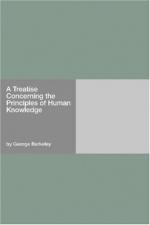21. Caution in the use of language necessary.—We have, I think, shown the impossibility of abstract ideas. We have considered what has been said for them by their ablest patrons; and endeavored to show they are of no use for those ends to which they are thought necessary. And lastly, we have traced them to the source from whence they flow, which appears evidently to be language.—It cannot be denied that words are of excellent use, in that by their means all that stock of knowledge which has been purchased by the joint labours of inquisitive men in all ages and nations may be drawn into the view and made the possession of one single person. But at the same time it must be owned that most parts of knowledge have been strangely perplexed and darkened by the abuse of words, and general ways of speech wherein they are delivered.[Note 1.] Since therefore words are so apt to impose on the understanding[Note 2.], whatever ideas I consider, I shall endeavour to take them bare and naked into my view, keeping out of my thoughts so far as I am able, those names which long and constant use has so strictly united with them; from which I may expect to derive the following advantages:
[Note 1: “That it may almost be made a question, whether language has contributed more to the hindrance or advancement of the sciences.”—Edit 1710.] [Note 2: “I am resolved in my inquiries to make as little use of them as possibly I can.”—Edit 1710.]
22. First, I shall be sure to get clear of all controversies purely verbal—the springing up of which weeds in almost all the sciences has been a main hindrance to the growth of true and sound knowledge. Secondly, this seems to be a sure way to extricate myself out of that fine and subtle net of abstract ideas which has so miserably perplexed and entangled the minds of men; and that with this peculiar circumstance, that by how much the finer and more curious was the wit of any man, by so much the deeper was he likely to be ensnared and faster held therein. Thirdly, so long as I confine my thoughts to my own ideas divested of words, I do not see how I can easily be mistaken. The objects I consider, I clearly and adequately know. I cannot be deceived in thinking I have an idea which I have not. It is not possible for me to imagine that any of my own ideas are alike or unlike that are not truly so. To discern the agreements or disagreements there are between my ideas, to see what ideas are included in any compound idea and what not, there is nothing more requisite than an attentive perception of what passes in my own understanding.




